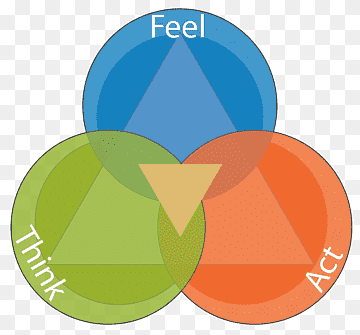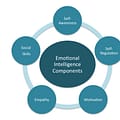“What matters for success, character, happiness, and lifelong achievements is a definite set of emotional skills – your EQ — not just purely cognitive abilities that are measured by conventional IQ tests.” —
Daniel Goleman
Emotional intelligence is the point at which cognition and emotion intersect, it increases our capacity for resilience, motivation, empathy, reasoning, stress management, communication, and our ability to read and navigate a wide range of social situations and conflicts.
Managers and Leaders who are experts in recognizing and managing their emotions have a better ability to perceive others’ feelings and know how to motivate employees, build trust and transparency with them, use their potential fully, and build strong, cohesive, and high-performing teams.

Knowing your weaknesses will help you to seek support and outsource them to the right people.
Those who don’t can have a hard time engaging the employees, motivating them, improving their performance, building cohesive teams, and seeing a slip in performance.
They also have a tough time collaborating, resolving conflicts, and making well-informed and well-thought-out decisions.
EI is instrumental for success in your professional and personal life and if refined allows you to accomplish a more fulfilling and joyful life.
Though not everyone has the same degree of emotional intelligence, the good news is that it can be cultivated by making certain practices a part of your lifestyle. And become more confident, positive, and kind.
This post aims to share practices that are important for the success and well-being of all in the workplace.
If you are aiming to be a successful manager /leader who desires to have healthy relationships with everyone in workplace, good mental and emotional health, have more impact and influence, build a strong cohesive team, and accomplish projects then you will find immense value in this post if you stick till the end.
1.KNOW YOUR STRENGTHS AND WEAKNESSES –Have an accurate awareness of your strengths and weaknesses so that you can use your strengths optimally to feel more fulfilled and joyful and be more productive.
2.INCREASE EMOTIONAL CONNECTION WITH YOURSELF
“When awareness is brought to an emotion, power is brought to your life.”
Tara Meyer Robson
You must increase emotional connection with yourself by understanding your own emotions by getting in touch with your thoughts and feelings.
Increasing your emotional connection can give you the ability to recognize unhelpful thoughts, feelings, and emotions and bring them under control and set you free.
Make it a habit to step back and examine your emotions several times in the day and examine what triggers certain emotions.
By examining the triggers of certain emotions you can then prepare for those moments and create a more emotionally intelligent response.
You can then be honest with your emotions.
It is a powerful skill to slow down and ask what it is you truly think and feel, and then stepping up and saying it.
Ask yourself questions like –
What caused your emotions to change?
Do you control your emotions, or do they control you?
This will have a positive impact on your health and work performance and prevent unnecessary conflicts in the workplace.
Some of the most helpful activities that will help you in increasing your emotional connection are:
Journaling .
Reflecting .
Meditation .
Mindful Breathing.
Yoga
Drawing.
Setting goals.
Creative visualisation.
Developing empathy and interpersonal understanding.
Taking regular feedback and accepting it without becoming defensive.
3. PAUSE BEFORE RESPONDING
‘’ Silence is a great source of strength ‘’
Lao Tzu
A thoughtful contemplation is a sign of high emotional intelligence.
When someone says something, make it a habit of pausing and responding instead of reacting or replying immediately.
A moment of reflection will help you process emotionally intelligent responses and prevent you from giving brash and poorly thought responses and making people feel uncomfortable.
Take a 20-second pause or a couple of deep breaths.
There is a power in the pause between the stimulus and response.
It is a powerful opportunity to choose your responses and shift the conversation or energy in the room.
This pause between the stimulus and response will help your feelings to get out or subside.
Good leaders take time to recognize and take control of the space between the stimulus and response.
It is important for emotional regulation. It allows you to quiet the overactive amygdala and bring your rational side into action so that you are in control of your brain and emotions.
People who are reactive stand a higher chance of being kicked out of jobs and are unhappy.
4. BE SELF MOTIVATED – Be a role model for your team. A role model who is highly motivated, confident, and positive.
The better role model you are, the stronger your team will be. They will be inspired by your example to take courageous action.
Keep your eyes on achieving the organizational goals instead of personal benefits like a promotion or increase in salary.
These things will automatically come.
5. BE SPECIFIC AND IDENTIFY YOUR EMOTIONS ACCURATELY
Only 36 % of people, according to the research, can identify their emotions accurately.
If you acknowledge your emotions and give yourself time to process them, you can carefully craft how you respond and avoid doing anything that could jeopardize the goodwill you’ve worked hard to build in a healthy, positive way.
Labeling your emotions accurately is important to take appropriate action.
A vague description of emotions leads to misunderstanding, inappropriate actions, and irrational choices.
Using vague words like feeling Bad, Down or Low is not enough.
Specific words like ‘’Irritable, Frustrated, downtrodden, forsaken, guilty, or anxious are much more specific and accurate.
So have a wider and more robust emotional vocabulary.
Try jotting down what it is you’re feeling and what caused the distress. You’ll likely start identifying patterns.
If you know what triggers you, the next time a similar situation occurs, you’ll be better positioned to handle it.
6 . BE ASSERTIVE – Aggressiveness, unempathetic behavior, rudeness, lack of tact, or confrontation will lead to more conflicts and give rise to many enemies in the workplace.
Observe how people respond when you speak. How you react when others speak.
Do you rush to judgment?
Is there a misalignment between your facial expression or body language and your words? Do both express something different?
You can make easy improvements simply by noticing your negative words, expressions, and feelings and making adjustments.
Think before you speak and calm down when your emotions overwhelm you.
Assertiveness coupled with kindness and compassion will help handle difficult people effortlessly and prevent conflicts from arising in the first place, leading to a more healthy work environment.
Be friendly and open, firm and polite, and guard your boundaries, commitments, and time.
.
7 . BE CARING TOWARDS PEOPLE AROUND YOU
Empathy is the top leadership skill today.
According to DDI’s research, leaders who excel at listening and responding with empathy perform more than 40 percent higher in coaching, planning, and decision-making.
Empathetic leaders are found to engage their employees more productively, build more trust with them, retain them longer, and build a stronger company culture.
They experience an increase in revenue too.
To be caring towards people around you, be empathetic and curious.
Practice active listening to know what they are going through to relate well with them.
This skill will help you understand other person’s emotions and experiences and respond appropriately.
8. DON’T HOLD GRUDGES – It is common to hold grudges when someone mistreats you.
Holding onto a grudge triggers more negative thoughts and emotions which are stressful responses.
Stress weakens the immune system and has manifold devastating consequences on your health.
It is therefore wise to remember the lesson and forgive the person. Forgiveness brings you peace and protects your energy.
9. HAVE MORE FUN – Infuse fun in everything you do. Making work fun and doing it with happiness removes boredom and monotony it.
10. MAINTAIN WORK-LIFE BALANCE BY ENJOYING THE THIGNS YOU LOVE TO DO
When things are little messy negative emotions can get the better of you very quickly and can be harder to control.
Ensure that you find time to relax; take a break, and do an activity you enjoy or spend 10 minutes taking deep, refreshing breaths.
Maintaining a healthy work-life balance like pursuing a hobby or connecting with friends and family, traveling, going for marathons, or taking breaks helps alleviate stress and make you more resilient.
11 .STOP PAYING HEED TO OTHER PEOPLES EMOTIONS AND OPINIONS
Be your authentic self.
When you have accomplished something, or are happy about something, there will always be someone who will have an opinion of you or be unhappy about it.
It is difficult to stop people from judging you.
At times people will have strong emotions and you must learn to tolerate them.
It is necessary for self-regulation. You don’t have to get angry or overwhelmed in return.
You can calm down and confront them to express your needs and wants.
It will help you know others intimately.
Know your self-worth. Paying attention to what others say will only ruin your self-esteem and confidence.
Remember, others’ problems and reactions are not your own.
12. ADMIT YOUR MISTAKES
By admitting mistakes you show your humanness and humility.
Similarly, be considerate of others’ mistakes.
Mistakes are mistakes and not character defects. They cannot be corrected by punishments. They require repairing and learning from them.
13.SURROUND YOURSELF WITH POSITIVE PEOPLE- Having negative people around you will drain your energy and vitality.
Negative people are the ones who see problems in solutions, always complain and cringe or gossip.
Be in the company of optimistic people.
They are solution-oriented, always smiling, laughing more, open-minded, caring, and kind, and will energize and uplift you.
14.LET GO OF THE PAST- Be forward-moving. Let go of old beliefs, bad experiences of the past, any grudges, resentments, past mistakes, or failures and learn from them.
Everyone has temporary setbacks and struggles.
Look for a new direction or find energy in a new path.
See, possibilities and opportunities in the future.
No failure is permanent, and neither is success.
15.BE POSITIVE
“There are certain emotions that will kill your drive; frustration and confusion. You can change these to a positive force. Frustration means you are on the verge of a breakthrough. Confusion can mean you are about to learn something. Expect the breakthrough and expect to learn.”
— Kathleen Spike, Master Certified Coach
As the quote above says, negative emotions or positive emotions lead to corresponding thoughts.
One Positive thought leads to a string of many more negative thoughts.
Similarly, one negative thought gives rise to a gamut of negative thoughts, pulling you down the spiral.
The more you dwell on them, the more power you give them.
They are just thoughts and not facts.
Stopping negative thoughts in the first place is a big step in developing your emotional intelligence.
In a study, it was found that 80% of our thoughts are negative.
The News regarding violence, disasters, recession, war, bad past experiences, and negative beliefs are the sources of negative thoughts.
Getting caught in them will lead to emotional exhaustion and lower your emotional intelligence.
Certain things are out of your control and you can do nothing about it.
What is under your control is your thoughts, attitude, beliefs and behavior, your knowledge and skills.
You must focus your attention and effort on what you can control.
Even when the situation is not according to your expectations, look at what is positive in the situation.
Secondly, If you try not to think of Negative thoughts, they will spring back into your mind more and more.
The best way to combat them is to replace them with positive thoughts.
Instead of saying, the ‘’weather is so bad ‘’, say ‘’ I am going to do what it takes to make my workplace or house environment comfortable to work in .’’
16. SET BOUNDARIES – It happens in life sometimes that people misuse your time and energy.
Setting healthy boundaries around your time and energy will protect you from being taken advantage of by others and spend your energy wisely.
17.ASK FOR HELP AND SUPPORT
Sometimes you lose trust and stop taking help from anyone. Doing everything by yourself only makes you more anxious.
Your life shrinks and expands in proportion to your thoughts. Losing trust shrinks your relationships and self-expansion.
It is important to realize that you are not independent, but interdependent.
Therefore you must never hesitate to ask for help.
.
18.BE FOCUSED – Be so focused on your life, career, and what you want to do that things around you don’t easily distract you.
Practice mindfulness to not let negative thoughts or impulses distract you.
19.BE PROACTIVE
Proactive is the opposite of reactive.
Reactive people are on autopilot, always responding to whatever comes their way. They are not fully awake.
Proactive people are wide awake and they are consciously shaping what they do, what they decide, and what they want.
To be Proactive, practice the skill of stepping back and having a look at what you are doing, why, and how you are doing it.
Then you can make well-informed decisions about what to keep and what to change.
It is more about being in the drivers seat of your life.
20. STOP PERFECTIONISM -There is no such thing as perfect. Everything is constantly changing and evolving.
Perfectionism is the enemy of goals and acts as an obstacle to achieving your goals because it will paralyze your decision-making and prevent you from taking the first step.
21. EMBRACE CHANGE
In the world, everything is constantly in a state of movement.
Nothing is stagnant. Change is the law of nature and the truth of life.
The sooner you accept this and learn to embrace it the better off you will be.
Progressive people know this fact and that is why they are successful in what they do.
Adapt your thinking around the change by making mental shifts.
22. MAKE LEARNING AND GROWING AN ONGOING PART OF YOUR LIFE
Learning, growing, and evolving prevents you from becoming stagnated and outdated.
It helps you take calculated risks, bring intimacy into relationships, and discover things about yourself you fully did not know.
It desensitizes anxiety, makes you braver, and expands your life and your world.
Being open-minded and welcoming fresh ideas from others will help you stay relevant, fresh, and exuberant.
23.DETERMINE YOUR VALUES AND LIVE BY THEM
Imagine a life that you want to live.
Identify the things you believe in and value in life. Eg Your health, time, relationships, work, fun, etc.
This will help you in operating from your authentic self and leading a fulfilling life.
Put your values into work every day with humility, honesty, and compassion for yourself and others.
It will create a life of integrity where your inner reality and outward reality match.
CONCLUSION
Modern workplaces are evolving, and research is supporting that managers and leaders with higher Emotional Intelligence are better equipped to work cohesively within teams, deal with change more effectively, and manage stress – thus enabling them to pursue business objectives.
Emotional intelligence is the key to a fulfilled and happy life by being more self-aware and healthily managing our emotions.
Being emotionally intelligent will make a positive difference in your relationships with friends and coworkers as well as in your personal life.
To sum up, to hone your emotional intelligence skill know yourself well.
Know your strength and weakness and use your strengths well.
Deal with emotions before they get the better of you.
Admit what you don’t know
Have a deep sense of purpose.
Respect the diversity of thoughts and ideas.
Be compassionate towards others.
Help in developing the talents of others.
I believe you have found immense value in the practices that I have shared above.
Which of the practices will you implement from now onwards?
Share your thoughts below.
Do you want to Master your Emotional Intelligence and Deal with Difficult Emotions Mindfully? Get the FREE GUIDE below .








